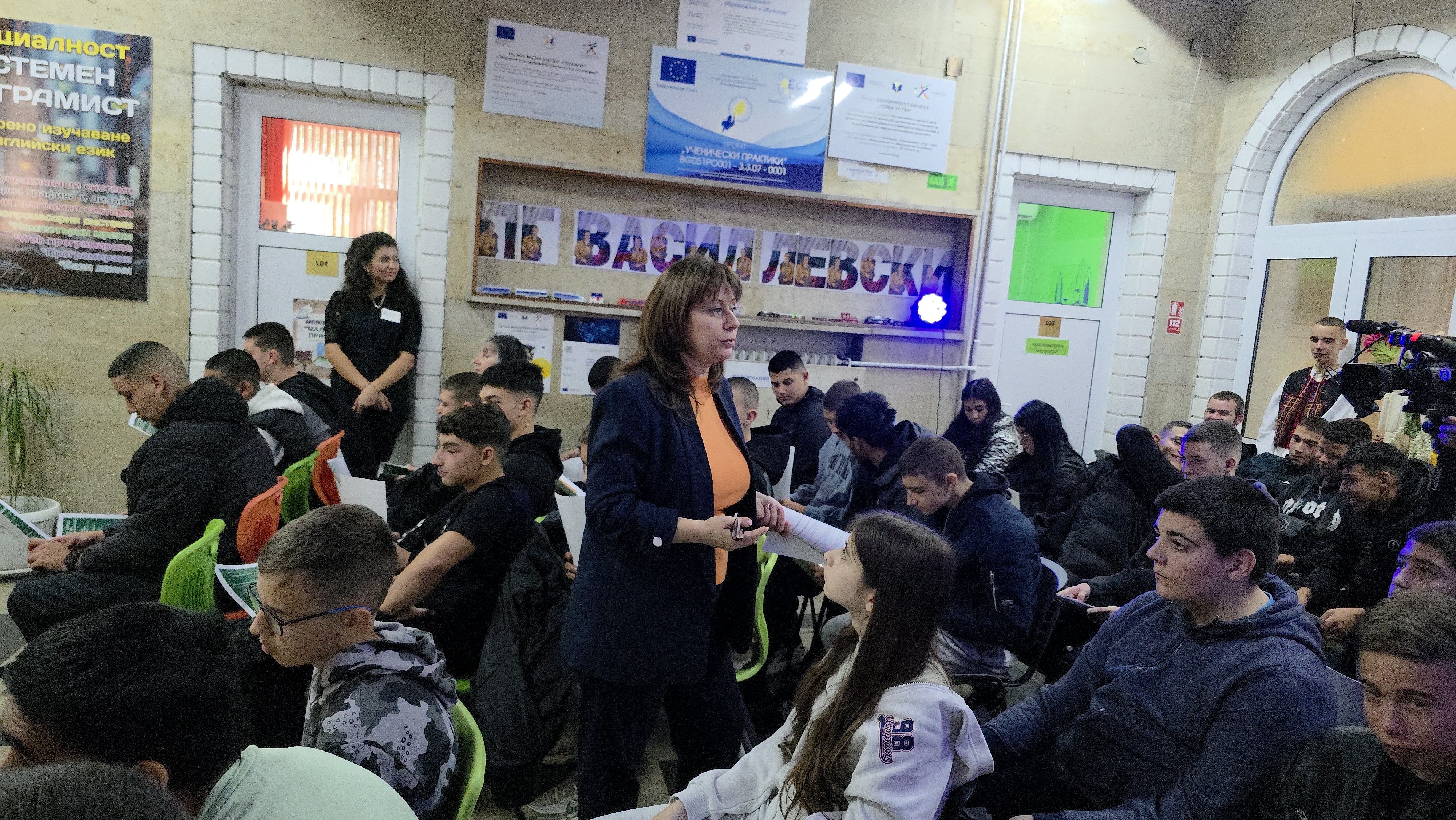News
Ombudsman visits a civic education lesson at Vasil Levski Vocational High School in Mezdra: "Human rights end where the rights of others begin"

21 October 2025
Ombudsman Velislava Delcheva held an open lesson on civic education at Vasil Levski Vocational High School in Mezdra at the invitation of the school's principal, Miroslav Pavlov. The meeting was part of the Ombudsman's initiative to promote civic awareness and knowledge of fundamental human rights among young people.
The lesson was also attended by the Deputy Mayor of Vratsa Municipality, Neli Mineva, and the Head of the Regional Education Department of Vratsa, Loreta Koleva.
During the meeting, Velislava Delcheva talked to the twelfth graders about the role of the Ombudsman, what rights the Institution protects, and when and how citizens, including children, can file complaints. The Ombudsman gave specific examples from her practice of successfully resolved cases and explained when young people can sign their first employment contracts.
The conversation began with current topics related to aggression among young people and ways to overcome negative behaviours.
"The right to life is one of the fundamental rights that we all possess. If someone infringes on my right to life, all other rights become meaningless. The right to education, to work, to childhood – none of these matter because the fundamental right has already been taken away," Delcheva told the students.
The Ombudsman encouraged young people to be proactive and to contact the Institution on any issues that concern them – via social media, by phone, by email, or in person at the reception desk.
I can be a mediator between you and the people higher up – ministers, members of parliament. You can use me when you think someone is doing something you disagree with," Delcheva emphasized.
During the discussion, the students also deliberated on the ban on mobile phones in school. The young people explained that their high school has rules – devices are not to be used during class, but are allowed during breaks.
"For me, bans don't work. Rules are more important – and it's even more important when we create them ourselves and then follow them," the Ombudsman summarized.
The possibility of students requesting an increase in their final exam grades, if they are different from "Poor," was also discussed, as well as the upcoming subject "Virtues and Religions." In a conversation with one of the children, a Moroccan student, he shared that his parents are of different religions and he would like to study both, which raised the issue of respect for diversity and tolerance.
When asked whether human rights have limits, Velislava Delcheva replied: "Human rights end where the rights of others begin."
When asked whether human rights have limits, Velislava Delcheva replied: "Human rights end where the rights of others begin."
After the meeting at the high school, the Ombudsman and a team of experts held an open reception for citizens in the municipality of Mezdra. Delcheva reported that most complaints were related to consumer issues – water supply and sewerage, district heating, energy companies, banks, and credit institutions. These were followed by complaints related to property rights, as well as labour and social security rights.
"When I request information or verification from a relevant institution, I always receive a response – sometimes with a delay, but always with a result. This is proved by the many specific cases in which the Ombudsman Institution has helped," Delcheva noted.
She also commented on her recommendation to Social Minister Borislav Gutsanov to ease the regime for applying for monthly child benefits by removing the requirement for parents to submit annual income certificates from their employers.
"The National Revenue Agency has this information – it can be provided ex officio and electronically. Parents should not be unnecessarily given the runaround," emphasized the Ombudsman.
During the day, Velislava Delcheva also presented the "Pensions in Euros" information campaign, aimed at the elderly, in connection with the upcoming introduction of the euro on 1 January 2026. Brochures and booklets provided by the Ministry of Finance and the Bulgarian National Bank were distributed on site, containing information on the conversion of amounts at the official exchange rate of 1 euro = 1.95583 leva. Using a QR code on the materials, elderly people can calculate leva in euros in real time.
Delcheva urged citizens to make their payments with bank cards and exchange their levs at banks and post offices, stressing that there is no need to re-sign contracts due to the introduction of the new currency.


